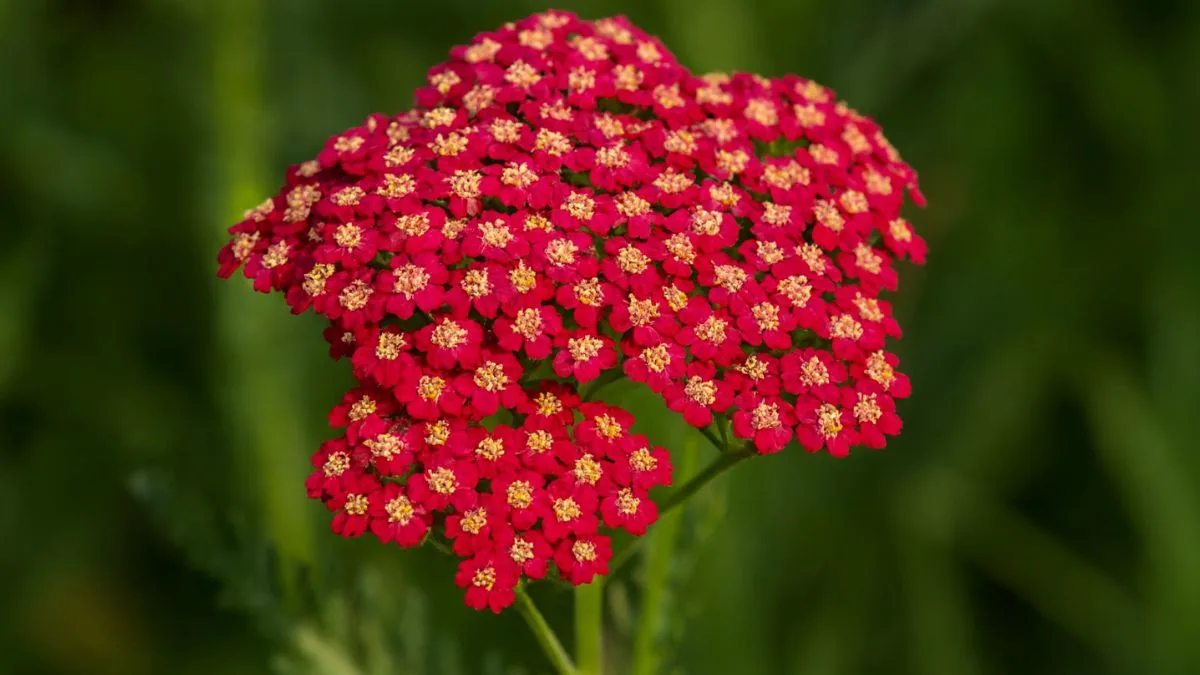Not every herb survives the test of centuries—but Yarrow has. From battlefields in ancient Greece to herbal kitchens in Canada and the USA, it has been a constant companion in natural healing. Warriors once used it for wound healing and anti-bleeding, and today it appears in teas, oils, and even skincare products.
I still remember trying yarrow tea during a cold spell. It didn’t just ease congestion—it gave me the comforting sense of using a remedy trusted across generations. That’s the magic of yarrow: simple, effective, and deeply rooted in tradition.
What Makes Yarrow Special?

Science backs what folklore always claimed. Yarrow contains compounds with potential medicinal properties, making it a versatile herb for internal and external health.
Modern studies reveal that Yarrow contains chemicals that might help to stop stomach cramps and fight infections, giving strong evidence for its use in digestive wellness and immunity.
This combination of tradition and research explains why yarrow has remained relevant from ancient apothecaries to today’s wellness shelves.
Healing Powers of Yarrow
-
Wound Healing and Anti-Bleeding
It’s earliest recorded use was on the battlefield. Soldiers would crush the leaves to stop bleeding—hence its nickname, “soldier’s herb.”
Even today, herbalists recommend yarrow salves and tinctures because it made it effective in wound healing and anti-bleeding. When applied directly, it speeds up clotting and protects against infections.
-
Reducing Inflammation
Ongoing inflammation is at the root of many chronic illnesses. Yarrow shines here because it is known for treating wounds, reducing inflammation, aiding digestion, and managing menstrual pain, while topical applications can soothe skin irritation.
Drinking yarrow tea or using tinctures helps in reduced inflammation, improved digestive health, and wound healing—a natural way to support long-term wellness.

-
Digestive Support
Stomach discomfort is one of the most common modern issues, but nature already had a solution. Yarrow contains chemicals that might help to stop stomach cramps and fight infections, making it highly valued in digestive care.
For centuries, people have used it for alleviating digestive complaints and symptoms of colds and flu. A warm tea not only calms cramps and bloating but also boosts recovery during seasonal illnesses.
Also Read: Peace Lilies: The Secret Weapon Against Mold in Your Bathroom
-
Women’s Health and Menstrual Pain Relief
Another remarkable benefit is its role in managing menstrual pain. The herb’s antispasmodic action reduces cramping, while its balancing effect on circulation helps regulate heavy bleeding.
This explains why yarrow tea is a trusted remedy for women across different cultures. A single herb offering relief for both digestion and menstrual health makes it unique in natural medicine.
-
Topical and Skin Benefits
Beyond internal use, yarrow is commonly used in herbal treatments and skincare products. Its antibacterial and anti-inflammatory actions mean topical applications can soothe skin irritation, helping with rashes, acne, and minor burns.
Infused into creams and oils, it speeds up skin recovery and reduces redness—making it a staple in natural beauty routines.
A Quick Look at Yarrow’s Benefits
Benefit Area |
How Yarrow Helps |
Wound Healing |
Made it effective in wound healing and anti-bleeding. |
Inflammation Relief |
Known for treating wounds, reducing inflammation, aiding digestion, and managing menstrual pain. |
Digestive Health |
Provides reduced inflammation, improved digestive health, and wound healing while alleviating digestive complaints and symptoms of colds and flu. |
Women’s Health |
Helps in managing menstrual pain and regulating cycles. |
Skin Care |
Commonly used in herbal treatments and skincare products, with topical applications that can soothe skin irritation. |
Yarrow in Modern Wellness
Despite being ancient, it is more popular than ever. Walk into a health store in North America and you’ll find yarrow teas, capsules, tinctures, and skincare creams.
Why? Because yarrow contains compounds with potential medicinal properties that make it reliable. It’s not a passing wellness trend—it’s a proven herbal ally.
Even in today’s world of synthetic medicines, more people are rediscovering traditional remedies like yarrow. Its ability to handle multiple concerns—wounds, digestion, colds, and skin—explains its staying power.
Also Read: Jade Plant Lifespan: How Long Can This Hardy Succulent Live?
Herbs come and go in popularity, but yarrow continues to prove its worth. It offers a wide range of benefits: treating wounds, reducing inflammation, aiding digestion, and managing menstrual pain, while topical applications can soothe skin irritation.
Whether you’re looking for reduced inflammation, improved digestive health, and wound healing, or a natural aid for alleviating digestive complaints and symptoms of colds and flu, yarrow is one herb that does it all.
From being commonly used in herbal treatments and skincare products to playing a role in menstrual health, yarrow isn’t just a folk remedy—it’s a science-backed natural healer.
So, if you’re building a herbal cabinet, don’t overlook yarrow. Its proven ability to heal wounds, calm inflammation, aid digestion, and support women’s health makes it one of nature’s finest gifts.






